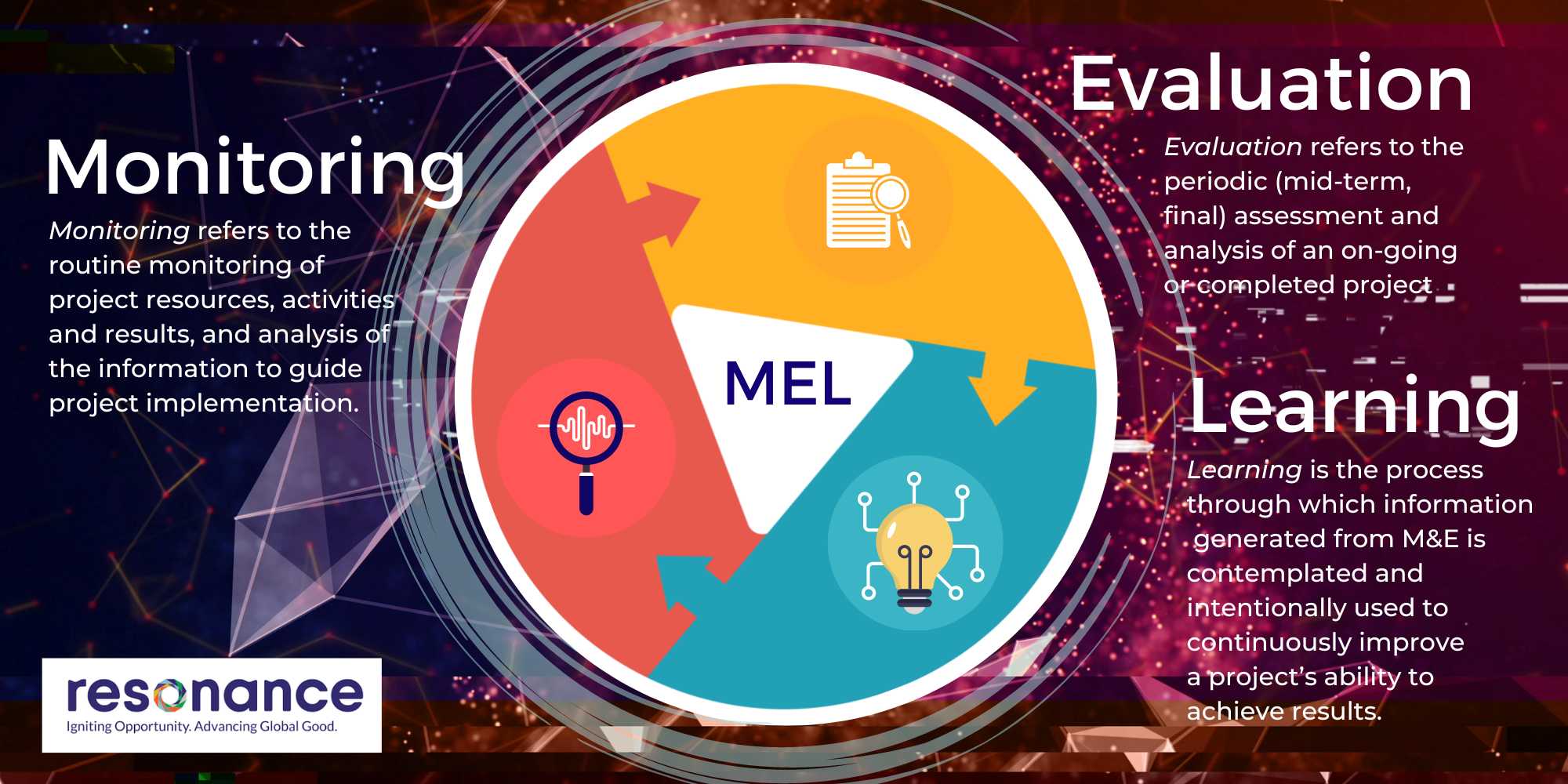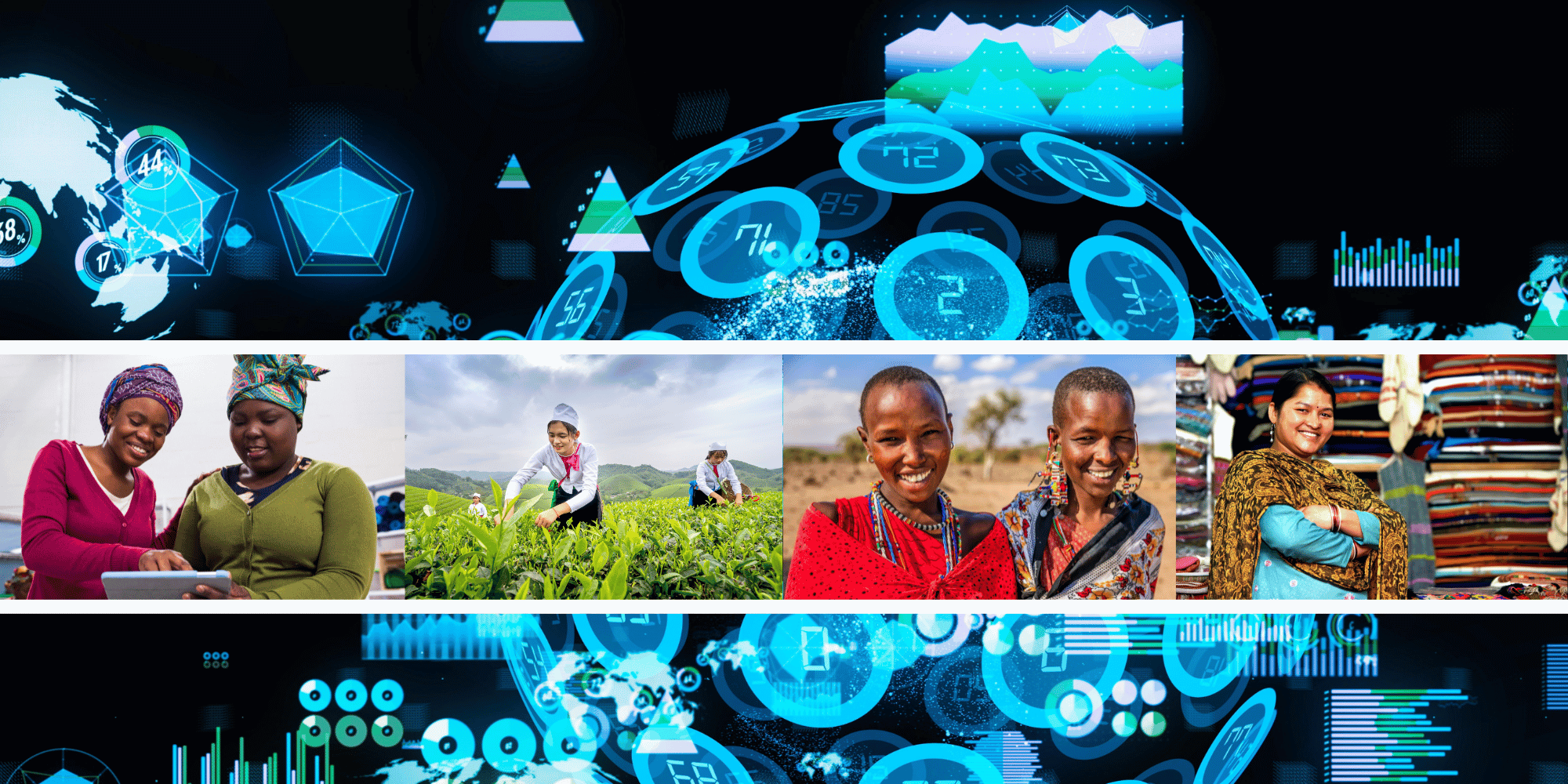At a recent training for USAID proposal writing, the facilitator noted a current employment trend in the global development and impact space: there is a growing need for MEL (Monitoring, Evaluation, and Learning) specialists, and not enough skilled professionals to fill the roles. Perhaps because we have such a deep bench of high-caliber MEL experts at Resonance doing exceptional work, this statement came as a bit of a surprise.
So, we did some research. In other words, we Googled it.
Sure enough, the number of job listings for MEL specialists was extensive – some tied to specific initiatives; others more general in implementing firms and catalyst organizations doing robust partnership work; still, others linked to training and facilitation consulting opportunities. It seemed like an ideal opportunity to promote this need broadly – not only to generate interest in our own career pathway opportunities at Resonance, but to also encourage those with applicable skills to join the wider MEL community. After all, MEL plays a critical role in global development, sustainability, and social initiatives and project outcomes, which can benefit our collective impact work in this space.
First, a Refresher: What is MEL?
Our Director of Monitoring, Evaluation, and Learning at Resonance, Monica Gadkari, has already written a general awareness piece regarding MEL and its components. To recap here, at its core, MEL is a system or cycle with all three components, monitoring, evaluation, and learning, working in tandem and as a thread through all project and program phases – from early design through implementation and completion.
MEL helps organizations clarify intentions, collect crucial data to assess effectiveness toward impact goals, and monitor levers for change. Ideally, MEL processes should also include the realistic evaluation of capacity, internally and externally across the landscape, to respond and adapt with agility in real-time.
Although more traditional monitoring and evaluation (M&E) functions tend to focus on producing data for accountability, as described by Mathmatica “MEL engages key decision makers who are motivated to improve programs, applies the most appropriate and credible tools and methods for addressing their urgent questions, and intentionally seeks to incorporate learning into program delivery. The approach helps funders and stakeholders foster ongoing learning to support the effective implementation of programs.”
What Skills are Necessary to Carry out the Role and Functions of a MEL Specialist?
Embedded in this description are cues to the various skills a MEL professional must have to meet the demands of this important and fulfilling role: attention to detail and organization; strategic goal setting including the ability to establish metrics and benchmarks; landscape analysis and monitoring capabilities; strong evaluative competencies; and the ability to be nimble with the ability to influence others to pivot when necessary, even during times of change and upheaval.
When examining some of the many listed MEL specialist positions on job sites, some additional requisite areas of expertise stand out. These include:
- The ability to conduct quantitative and qualitative field research using document review, direct observation, focus groups, key informant interviews, and small- and large-scale surveys.
- Demonstrated capacity to assemble and write an analytical product based on qualitative and quantitative data.
- Conduct and coordinate organization/initiative overall evaluation effort, including the preparation of the evaluation design and methodology and data collection instruments.
- Leverage a variety of evaluation methodologies, as appropriate, as well as analyze, synthesize and draw conclusions and lessons learned from various sources of data and findings.
- Research, evaluate and document information from multiple stakeholders.
- Prior experience using, developing, and maintaining reporting tools (e.g., DIS, Excel, etc.).
- Experience designing and/or facilitating staff MEL training and/or supporting MEL capacity-building initiatives in a humanitarian, development, or transition context.
- Experience in data management and analysis (quantitative and qualitative) with proven skills in at least one statistical package software for quantitative data analysis.
- Proficiency in development of monitoring and evaluation plans.
- Ability to strategize around a theory of change appropriate for the context and initiative.
- Excellent verbal communication and writing skills, including expert cross-cultural communication skills.
In terms of preparation, many MEL position openings require a bachelor’s degree in a relevant field such as economics, social sciences, statistics, policy, etc., plus at least 5 years of experience; many require a master’s degree or indicate it as highly desirable.
Most position descriptions emphasize the need to have acquired a great deal of knowledge of monitoring and evaluation methodologies, data analysis techniques and even project management experience.
Developing not only analytic skills, but also soft skills in communication, including written and verbal communication, is essential, as well as exhibiting extensive networking capabilities. It is also imperative to have strong problem-solving skills and background, including experience using the array of tools, approaches, and models often used in various phases of MEL. This includes the ADKAR model of change management, the Collaborating, Learning & Adapting (CLA) framework, and others specified by catalyst organizations such as USAID.
Training in MEL to Hone Skillsets
In addition to formal degrees, MEL practitioners-in-the-making can sometimes find training in MEL online or via various organizational offerings. This includes interval training offered through USAID, as well as specialized training topics offered through an array of organizations, such as the upcoming training workshops offered through MDF.
There are also an array of tools and examples of approaches available to help MEL professionals develop and refine their skills. This includes those available at USAID as part of the agency’s resource libraries. In addition, Mehdi Bousnina, a self-proclaimed MEL ambassador, maintains an extensive posting history of MEL resources on his LinkedIn page. If you haven’t already followed Mehdi, we suggest you do. His insights, shared articles, videos, and other resources are a great way to help every aspiring MEL specialist better prepare for their role and creative tasks.
Resonance MEL Approach
Effective MEL helps organizations direct investments toward solutions that work. Our approach to MEL draws on user-centered design, efficient and effective performance monitoring, industry-leading evaluation approaches, and learning that promotes adaptive management.
We have developed and operationalized MEL plans, co-developed theories of change and results frameworks, and designed third-party evaluations across every technical sector in over 25 countries, including conflict zones and fragile states. We build context-sensitive MEL systems that support real-time decision making, deploy device-based data collection for data quality, and incorporate tools such as Dedoose, Atlasti, SPSS, and STATA for rigorous data analysis. We also emphasize Learning as part of the entirety of a well-designed MEL plan, and work with our clients to create KM solutions that are practical and well aligned with organizational processes and culture.
Perhaps one of the most exciting reasons for embarking on a career stint in MEL is that the field and practice itself is by necessity always evolving in response to change -- in client goals and expectations, in technology, data, and tools, and in demands for more accurate, accessible, transparent, inclusive, and transformative evidence for casebuilding, reporting, and transformative impact. Therefore, MEL practitioners and experts tend to embrace and value utilizing creativity and innovation to evolve tools and approaches.
In response to this ongoing dynamic, MEL is now offered as one of 4 integrative solution approaches as part of Resonance Evidence For Transformation (E4T) services, newly named to better reflect ever growing and innovative offerings across our USAID, catalyst/foundations, partnership, and private sector project and client portfolio. In addition to MEL, these services includes Knowledge Management, Data & Analytics, and Change Management, and approaches can be stand alone or integrated depending on client needs and roadmaps.
These services are often highly-specialized, and as such, we are always looking for well-trained, highly skilled MEL experts to join us on our global development and sustainable impact initiatives either as staff or on a consulting basis. If you are interested, feel free to reach out to us to learn more, or to explore emerging opportunities.
Editor’s Note: This post has been updated for accuracy and current best practices.



